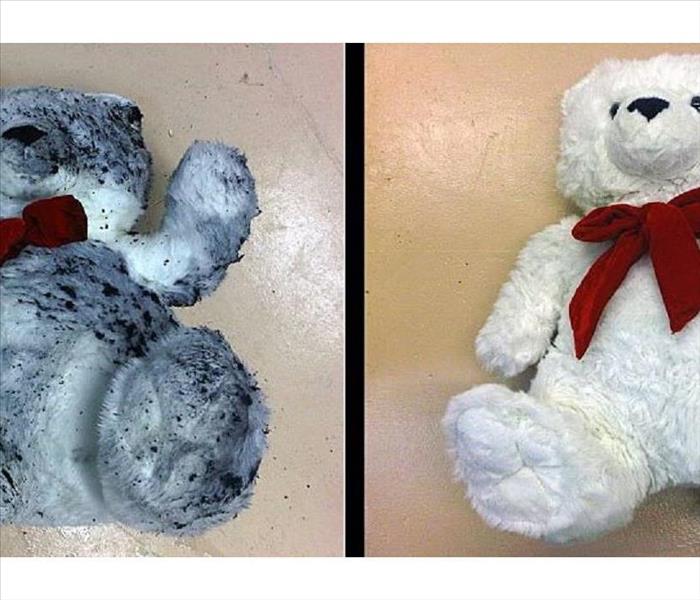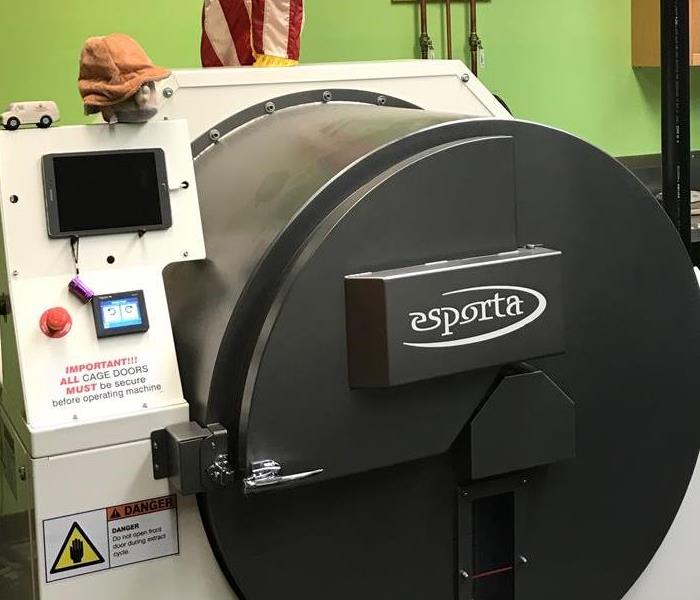Recent Cleaning Posts
Crime Scene Cleanup
2/3/2021 (Permalink)
Crime scene cleanup is a term applied to cleanup of blood, bodily fluids, and other potentially infectious materials (OPIM). It is also referred to as biohazard remediation, because crime scenes are only a portion of the situations in which biohazard cleaning is needed. Such incidents may include accidents, suicides, homicides, and decomposition after unattended death. It could also include mass trauma, industrial accidents, infectious disease contamination, animal biohazards (e.g. feces or blood) or regulated waste transport, treatment, and disposal.
Television productions like CSI: Crime Scene Investigation have added to the popularity of the term "crime scene cleanup". Australia, Canada and England have added it to their professional cleaning terminology. As a profession, it is growing in popularity because of media exposure and the growth of training programs worldwide.
The generic terms for "crime scene cleanup" include trauma cleaning, crime and trauma scene decontamination ("CTS Decon"), biohazard remediation, biohazard removal, blood cleanup and crime scene cleanup. The state of California refers to individuals who practice this profession as "Valid Trauma Scene Waste Management Practitioners".
Types of cleanups
Crime scene cleanup includes blood spills following an assault, homicide or suicide. There are many different sub-segments, named primarily after additional collateral, contingency, or preconditions, regarding the presence of non-blood borne organics, toxic irritants (e.g.,tear gas) or disease vectors. However, it is the legality of charging a fee for mitigating potentially harmful biohazard situations that differentiates a registered crime or trauma practitioner from any general restoration, carpet cleaning, janitorial or housekeeping service.
With concerns about Ebola contamination in the United States, crime scene cleanup companies like Cleaning Guys of Texas and Bio Recovery Corporation of New York have been contracted by government to clean more than just crime scenes.
Crime Scene Cleaning
2/3/2020 (Permalink)
Crime scene cleanup is a term applied to cleanup of blood, bodily fluids, and other potentially infectious materials (OPIM). It is also referred to as biohazard remediation, because crime scenes are only a portion of the situations in which biohazard cleaning is needed. Such incidents may include accidents, suicides, homicides, and decomposition after unattended death. It could also include mass trauma, industrial accidents, infectious disease contamination, animal biohazards (e.g. feces or blood) or regulated waste transport, treatment, and disposal.
Television productions like CSI: Crime Scene Investigation have added to the popularity of the term "crime scene cleanup". Australia, Canada and England have added it to their professional cleaning terminology. As a profession, it is growing in popularity because of media exposure and the growth of training programs worldwide.
The generic terms for "crime scene cleanup" include trauma cleaning, crime and trauma scene decontamination
("CTS Decon"), biohazard remediation, biohazard removal, blood cleanup and crime scene cleanup. The state of California refers to individuals who practice this profession as "Valid Trauma Scene Waste Management Practitioners".
Types of cleanups
Crime scene cleanup includes blood spills following an assault, homicide or suicide. There are many different sub-segments, named primarily after additional collateral, contingency, or preconditions, regarding the presence of non-blood borne organics, toxic irritants (e.g.,tear gas) or disease vectors. However, it is the legality of charging a fee for mitigating potentially harmful biohazard situations that differentiates a registered crime or trauma practitioner from any general restoration, carpet cleaning, janitorial or housekeeping service.
With concerns of Ebola contamination in the United States, call the professionals at SERVPRO
Crime Scene Cleanup
2/8/2019 (Permalink)
Crime scene cleanup is a term applied to cleanup of blood, bodily fluids, and other potentially infectious materials (OPIM). It is also referred to as biohazard remediation, because crime scenes are only a portion of the situations in which biohazard cleaning is needed. Such incidents may include accidents, suicides, homicides, and decomposition after unattended death. It could also include mass trauma, industrial accidents, infectious disease contamination, animal biohazards (e.g. feces or blood) or regulated waste transport, treatment, and disposal.
Television productions like CSI: Crime Scene Investigation have added to the popularity of the term "crime scene cleanup". Australia, Canada and England have added it to their professional cleaning terminology. As a profession, it is growing in popularity because of media exposure and the growth of training programs worldwide.
The generic terms for "crime scene cleanup" include trauma cleaning, crime and trauma scene decontamination ("CTS Decon"), biohazard remediation, biohazard removal, blood cleanup and crime scene cleanup. The state of California refers to individuals who practice this profession as "Valid Trauma Scene Waste Management Practitioners".
Types of cleanups
Crime scene cleanup includes blood spills following an assault, homicide or suicide. There are many different sub-segments, named primarily after additional collateral, contingency, or preconditions, regarding the presence of non-blood borne organics, toxic irritants (e.g.,tear gas) or disease vectors. However, it is the legality of charging a fee for mitigating potentially harmful biohazard situations that differentiates a registered crime or trauma practitioner from any general restoration, carpet cleaning, janitorial or housekeeping service.
With concerns about Ebola contamination in the United States, crime scene cleanup companies like Cleaning Guys of Texas and Bio Recovery Corporation of New York have been contracted by government to clean more than just crime scenes.
Restore Your Child's Favorite Stuffed Animal
7/24/2018 (Permalink)
It's often the little things that means the most when your home is hit with disasters. The lumber, drywall and flooring can call be "easily" replaced after a fire or flood. However, it is your child's favorite stuffed animal that is irreplaceable. Fortunately, their favorite stuffed animal can be restored by an Esporta Certified Operator at SERVPRO Woodbury/Deptford using the Esporta Wash System.
Smoke Damage, Water damage, Crime Scene Cleaning, Soot Damage, Bio hazard cleaning,
3/5/2018 (Permalink)
Esporta's patented and proprietary technology is the most effective washing solution available today, and arguably, one of the most significant breakthroughs in cleaning technology since the introduction of the electric washing machine.
Items are held stationary and passed through detergent-laden water. The combination of the patented hydraulic action and the proprietary, environmentally friendly detergents results in the removal of over 99% of the organic and inorganic contaminants. Laboratory results indicate that this process is five time more effective than traditional washing machines.
Esporta's patented wash technology ensures that we can provide exceptional quality soft contents restoration.
What can be restored in the Esporta Wash System?
- Leather goods of all kinds
-Shoes
-Purses
-Jackets
-Wash and fold
-Press and hang
- Household goods of all kinds
-Sleeping bags
-Pillows
-Comforters
-Stuffed animals
What types of damages and contamination can we restore?
- Contaminated water & sewage
- Heavy smoke and soot
- Mold
- Bio waste contaminated goods
3 Surprising Things You Can Do To Reduce the Smell of Cigarette Smoke
2/12/2018 (Permalink)
3 Surprising Things You Can Do To Reduce the Smell of Cigarette Smoke
Home deodorization in Woodbury/Deptford, NJ, can be a challenge, especially if you or a family member smokes. Whether you are getting ready to host friends or family members or you just want to be ready for unexpected company, here are a few surprising things you can do to reduce the smell of cigarette smoke in your furniture and carpets and throughout your home.
1. Use Vinegar
Vinegar might not be the first thing that comes to mind when you think of cigarette removal, but it’s very good at removing stubborn scents from a variety of fabrics. If you have pillow cases, blankets or decorative throws that are saturated with the scent of your cigarettes, throw them in the wash with two cups of vinegar. Then put them through a regular drying cycle. You’ll be surprised at how fresh-smelling they are when you pull them out. If the smell of cigarette smoke lingers, wash them once more to get rid of it completely.
2. Sprinkle Baking Soda on Furniture
Baking soda is a well-known air-freshening tool. It’s frequently used in refrigerators to soak up the smell of old, rotten food. You can also use it to absorb the smell of stale cigarette smoke. For home deodorization purposes, sprinkle baking soda on all soft furniture surfaces in your home. It won’t work very well on leather, but it should work great on fabric furniture. After sprinkling generously across all furniture, use your hands to smooth it out and make it disappear into the fabric. After letting it sit for at least 10 minutes, vacuum it up. You can use the same technique on carpets, rugs and drapes.
3. Repaint or Replace
In some cases, cigarette odor is so pervasive that it can’t be removed with simple cleaning methods. In this case, may want to consider repainting your home or replacing old, smelly carpets if the scent bothers you enough.
If you have tried the above steps and you still have an odor, try calling professional restoration services. They have the tools and expertise necessary to handle your home deodorization needs.
For more information, visit http://www.SERVPROwoodburydeptford.com/






 24/7 Emergency Service
24/7 Emergency Service

